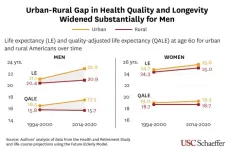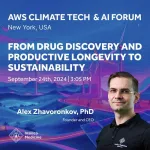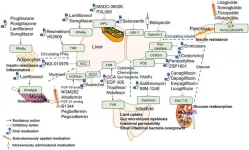(Press-News.org) Rural men are dying earlier than their urban counterparts, and they’re spending fewer of their later years in good health, according to new research from the USC Schaeffer Center for Health Policy & Economics.
Higher rates of smoking, obesity and cardiovascular conditions among rural men are helping fuel a rural-urban divide in illness, and this gap has grown over time, according to the study published this week in the Journal of Rural Health. The findings suggest that by the time rural men reach age 60, there are limited opportunities to fully address this disparity, and earlier interventions may be needed to prevent it from widening further.
The findings also point to a rising demand for care in rural areas, which will particularly challenge these communities. Rural areas are more likely than urban ones to have shortages of healthcare providers and are aging faster as younger residents move to cities, which further shrinks the supply of potential caregivers.
"Rural populations face a higher prevalence of chronic diseases, which has serious implications for healthy aging," said lead author Jack Chapel, a postdoctoral scholar at the Schaeffer Center. "With an aging population and fewer physicians available, the burden on rural communities is set to grow, leading to significant challenges in providing care for those who will face more health issues in the future."
Researchers used data from the Health and Retirement Survey and a microsimulation known as the Future Elderly Model to estimate future life expectancy for rural and urban Americans after age 60. They also assessed their likely quality of health in those years – a measure known as heath-quality-adjusted life expectancy (QALE). They estimated health trajectories for a cohort of Americans who were 60 years old between 2014-2020 and compared it with a similarly aged cohort from 1994-2000.
They found 60-year-old rural men can now expect to live two years less than their urban counterparts – a gap that’s nearly tripled from two decades ago. Rural men can also expect to live 1.8 fewer years in quality health than urban men, with this disparity more than doubling over the same period. For women, the urban-rural gap in life expectancy and health quality is much smaller and grew more slowly over time.
Nearly a decade after a landmark study found that people with lower levels of education are more likely to die from so-called “deaths of despair” – such as drug overdose or suicide – this new study finds that while education was an important factor in determining health quality, it cannot fully explain the gap between urban and rural populations. After adjusting rural education levels to match those of urban areas, the gap in healthy life expectancy was cut nearly in half. However, disparities existed even within each educational group, suggesting important geographic factors beyond education contribute to differences in healthy life expectancy.
Researchers found that interventions to reduce smoking, manage obesity, and treat and control widespread heart disease would benefit older rural residents more than urban ones. However, most interventions researchers tested were not able to completely bridge the urban-rural divide in healthy life expectancy.
“While education matters, so does smoking, prevalent obesity, cardiovascular conditions – and simply living in a rural area – which leads not only to more deaths but more illness among rural American men,” said co-author Elizabeth Currid-Halkett, the James Irvine Chair in Urban and Regional Planning and a senior scholar at the USC Schaeffer Institute for Public Policy & Government Service.
“Closing the gap in healthy life expectancy between urban and rural areas for older adults would require encouraging health behavior changes earlier in life and making broader social and economic improvements in rural areas,” said co-author Bryan Tysinger, director of health policy simulation at the Schaeffer Center.
This work was supported by funding from the National Institute on Aging of the National Institutes of Health under award P30AG024968.
About the USC Schaeffer Center
The USC Schaeffer Center for Health Policy & Economics is a joint enterprise between the USC Price School of Public Policy and the USC Mann School of Pharmacy and Pharmaceutical Sciences. The Schaeffer Center is one of two flagship programs at the USC Leonard D. Schaeffer Institute for Public Policy & Government Service, formed in 2024 to develop evidence-based solutions to policy issues and educate future generations of public service leaders.
END
Growing divide: Rural men are living shorter, less healthy lives than their urban counterparts
The urban-rural gap in life expectancy and health quality for men nearing retirement age has widened over two decades
2024-09-25
ELSE PRESS RELEASES FROM THIS DATE:
During NY Climate Week, Alex Zhavoronkov PhD, Founder and CEO of Insilico Medicine, talks about Gen AI applications in drug discovery, longevity and climate change solutions at AWS Climate Tech & AI F
2024-09-25
Held annually, NY Climate Week is a pivotal event in the global climate change calendar. Bringing together notable leaders, celebrities, climate professionals, and innovators from around the world, the event serves as a critical platform for discussing and advancing climate action. This year’s theme, "It’s Time," underscores the urgency for immediate and ambitious efforts to tackle climate change, and the process could be accelerated with Generative AI and other cutting-edge technologies.
Insilico Medicine ...
First genome-wide comparison of vapers and smokers finds similar DNA changes linked to disease risk
2024-09-25
Young adults who vape show chemical changes in their DNA similar to those found in young adults who smoke — changes known to be linked to the development of cancer — according to a new study just published in the American Journal of Respiratory Cell and Molecular Biology.
A team of researchers from the Keck School of Medicine of USC measured DNA methylation, a chemical modification of DNA that can effectively turn genes “on” or “off, in the oral cells of young adult vapers, smokers and non-users. DNA methylation is vital to normal cellular ...
International research challenge to tackle knowledge gaps in women’s cardiovascular health
2024-09-25
DALLAS, Sept. 25, 2024 — The American Heart Association, celebrating 100 years of lifesaving service as the world’s leading nonprofit organization focused on heart and brain health for all, is joining with other top cardiovascular research funders around the world to support an international scientific research grant focused on women’s cardiovascular health. Scientific researchers around the world are invited to apply for the award to foster global advancements in understanding and improving the diagnosis, treatment and prevention of cardiovascular disease (CVD) among women.
A 2022 presidential advisory ...
Pipeline of new drug treatment for non-alcoholic fatty liver disease/metabolic dysfunction-associated steatotic liver disease
2024-09-25
Non-alcoholic fatty liver disease (NAFLD), recently reclassified as metabolic dysfunction-associated steatotic liver disease (MASLD), has become the most prevalent chronic liver disease globally. This reclassification underscores the metabolic dysfunction central to the disease, which spans a spectrum from simple steatosis to more severe forms like steatohepatitis, fibrosis, and cirrhosis. Given the significant overlap between MASLD and type 2 diabetes mellitus (T2DM), the therapeutic strategies for MASLD have increasingly focused on addressing metabolic derangements. Despite its global prevalence, no specific drugs have been approved for MASLD, highlighting an urgent need ...
Kissick Family Foundation, Milken Institute announce $3 million in funding for frontotemporal dementia research
2024-09-25
September 25, 2024 (Washington, DC)—The Kissick Family Foundation Frontotemporal Dementia (FTD) Grant Program, in partnership with the Milken Institute Science Philanthropy Accelerator for Research and Collaboration (SPARC), today announced six research teams awarded two-year grants to advance scientific understanding of FTD, totaling $3 million in new funding for this disease.
This inaugural cycle of the Kissick Family Foundation FTD Grant Program represents a unique philanthropic strategy that specifically targets basic or early-stage translational research projects that focus on those disease cases ...
How does cancer spread? Follow the map
2024-09-25
Metastatic cancer can be a devastating diagnosis. The cancer is spreading. It may travel to multiple organs in the body. This could mean more pain and ultimately, death.
Unfortunately, just how cancer spreads remains unclear. But now, Cold Spring Harbor Laboratory (CSHL) Professor Adam Siepel and colleagues have a way to better understand that process. New technology developed at Weill Cornell Medicine barcodes cells to track the highways by which prostate cancer spreads throughout the body.
The resulting roadmap shows that most cancer cells actually stay put within the tumor. However, ...
Shrinking AR displays into eyeglasses to expand their use
2024-09-25
Augmented reality (AR) takes digital images and superimposes them onto real-world views. But AR is more than a new way to play video games; it could transform surgery and self-driving cars. To make the technology easier to integrate into common personal devices, researchers report in ACS Photonics how to combine two optical technologies into a single, high-resolution AR display. In an eyeglasses prototype, the researchers enhanced image quality with a computer algorithm that removed distortions.
AR systems, like those in bulky goggles and automobile head-up displays, require portable optical components. But shrinking the typical four-lens AR system to the size of eyeglasses or smaller ...
High academic award for economic geographer Ron Boschma
2024-09-25
Professor Ron Boschma is the first Dutch person to receive the Prix Vautrin Lud, the highest academic award within the field of geography. The award will be presented in Saint-Dié-des-Vosges, France on 6 October. Prior to the award ceremony, Prof. Boschma will give an invited lecture at the Sorbonne University in Paris on 4 October. Boschma was nominated for the award in recognition of his scientific contributions to the field of economic geography, especially for laying the foundations of evolutionary economic geography and his research into regional diversification and innovation policy. The European Union’s regional policy is based in part on his ...
Study reveals mallards' flight responses ineffective in preventing vehicle collisions
2024-09-25
Research Highlights Risk to Both Humans and Wildlife, Suggests Need for New Collision Mitigation Strategies
A recent article published in PeerJ Life & Environment has uncovered insights into how mallards (Anas platyrhynchos) respond to approaching vehicles, revealing that these common waterbirds are poorly equipped to avoid collisions, particularly at high speeds. The research, which used both simulated and real-world vehicle approaches, highlights the urgent need for improved methods to reduce bird-vehicle collisions—events that are not only financially costly but also dangerous to both humans and wildlife.
The study focused ...
Home- vs office-based narrowband UV-B phototherapy for patients with psoriasis
2024-09-25
About The Study: In this randomized clinical trial, home-based phototherapy was as effective as office-based phototherapy for plaque or guttate psoriasis in everyday clinical practice and had less burden to patients.
Corresponding Author: To contact the corresponding author, Joel M. Gelfand, MD, email joel.gelfand@pennmedicine.upenn.edu.
To access the embargoed study: Visit our For The Media website at this link https://media.jamanetwork.com/
(doi:10.1001/jamadermatol.2024.3897)
Editor’s Note: Please see the article for additional information, including other authors, ...
LAST 30 PRESS RELEASES:
Invisible battery parts finally seen with pioneering technique
Tropical forests generate rainfall worth billions, study finds
A yeast enzyme helps human cells overcome mitochondrial defects
Bacteria frozen in ancient underground ice cave found to be resistant against 10 modern antibiotics
Rhododendron-derived drugs now made by bacteria
Admissions for child maltreatment decreased during first phase of COVID-19 pandemic, but ICU admissions increased later
Power in motion: transforming energy harvesting with gyroscopes
Ketamine high NOT related to treatment success for people with alcohol problems, study finds
1 in 6 Medicare beneficiaries depend on telehealth for key medical care
Maps can encourage home radon testing in the right settings
Exploring the link between hearing loss and cognitive decline
Machine learning tool can predict serious transplant complications months earlier
Prevalence of over-the-counter and prescription medication use in the US
US child mental health care need, unmet needs, and difficulty accessing services
Incidental rotator cuff abnormalities on magnetic resonance imaging
Sensing local fibers in pancreatic tumors, cancer cells ‘choose’ to either grow or tolerate treatment
Barriers to mental health care leave many children behind, new data cautions
Cancer and inflammation: immunologic interplay, translational advances, and clinical strategies
Bioactive polyphenolic compounds and in vitro anti-degenerative property-based pharmacological propensities of some promising germplasms of Amaranthus hypochondriacus L.
AI-powered companionship: PolyU interfaculty scholar harnesses music and empathetic speech in robots to combat loneliness
Antarctica sits above Earth’s strongest “gravity hole.” Now we know how it got that way
Haircare products made with botanicals protects strands, adds shine
Enhanced pulmonary nodule detection and classification using artificial intelligence on LIDC-IDRI data
Using NBA, study finds that pay differences among top performers can erode cooperation
Korea University, Stanford University, and IESGA launch Water Sustainability Index to combat ESG greenwashing
Molecular glue discovery: large scale instead of lucky strike
Insulin resistance predictor highlights cancer connection
Explaining next-generation solar cells
Slippery ions create a smoother path to blue energy
Magnetic resonance imaging opens the door to better treatments for underdiagnosed atypical Parkinsonisms
[Press-News.org] Growing divide: Rural men are living shorter, less healthy lives than their urban counterpartsThe urban-rural gap in life expectancy and health quality for men nearing retirement age has widened over two decades





